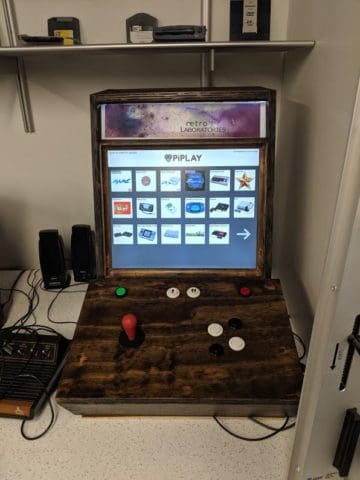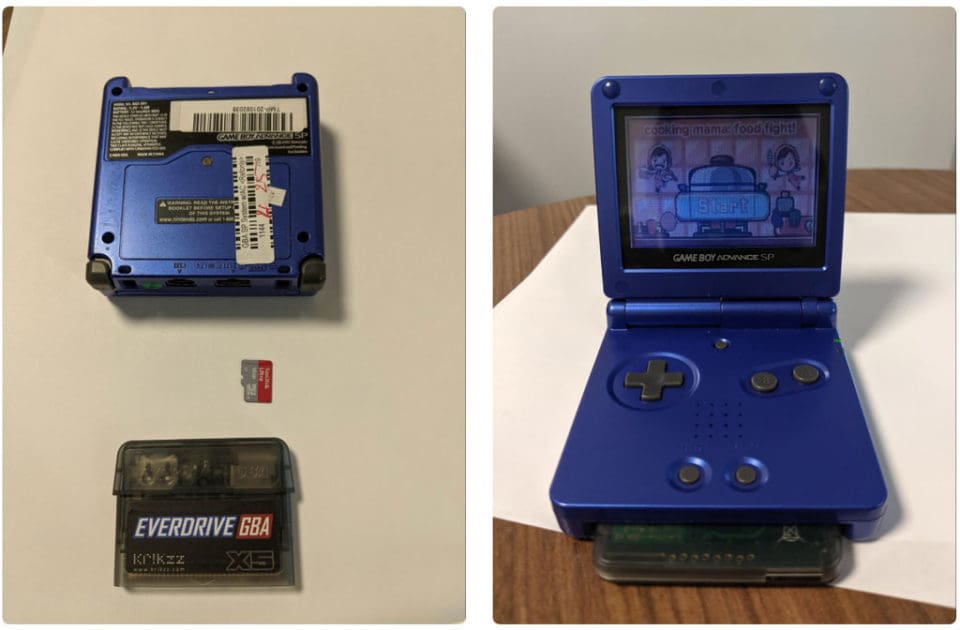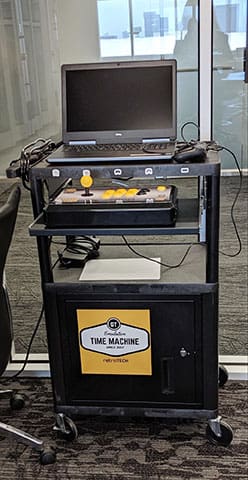Second Site Visit: GeorgiaTech
Hi y’all,
In July I visited the Georgia Tech Library’s Retrocomputing Lab also known as retroTECH! Located in the Special Collections and Archives unit, this lab’s mission is focused on supporting the Georgia Tech campus community in creating the future by exploring and preserving the past with technology. Like the first field site I visited, Living Computers: Museum + Labs, retroTECH creates exhibit experiences both online and offline that compliment hands-on research of historic computing technology. This service commitment allows for experiential learning and community building through the experience of using, playing, and understanding earlier computing cultures. retroTECH was created after a comprehensive user research study at Georgia Tech, where members of the community expressed interested in creating a library service and dedicated space for students to engagement with hands on vintage hardware and software. The lab is led and managed by Wendy Hagenmaier, who was also my fieldsite champion for the week I embedded with the team made up of other archivists, library workers, and student research assistants.

retroTECH comprises many things–from community crowdsourced driven exhibits, to mobile emulation “time machines”, a special collection of machines and gaming emulators (amongst many other kinds of machines). It’s also a place where GT community members can hangout, relax, and experience a range of gaming stations both emulated and original.
This summer, the Library including retroTECH moved into a newly renovated, renewed library building. The lab’s new space is shared with the Data Visualization lab, which allows for an innovative way of providing services, while collaborating with public services and other research librarians. Unlike a computing history museum, or university research archive, the retroTECH lab is nontraditional library service driven by software preservation and on-demand access. For their FCoP project, retroTECH proposed an online emulation environment where GT users and authorized researchers would be able to use emulated software from the lab’s collections for instruction, learning, and research. RetroTECH online will lay the groundwork to build a virtual community to showcase the people of Georgia Tech’s impact on the design and development of technology experiences. During my interviews, I interviewed public services, archivists, interns and student workers about their roles at retroTECH.
“Cooking Mama Food Fight”
For two days I shadowed Wendy to meetings and got to learn more about one proof-of-concept project called “Cooking Mama Food Fight Game Boy Advance.” Cooking Mama is a virtual cooking simulation game that was released for the GameBoy DS in 2006. Since then many spinoffs and new versions have been created, including the “Cooking Mama Food Fight” version at Georgia Tech. The Cooking Mama Food Fight exhibit allows users to access an oral history from a GT undergraduate student who created a game in Computer Science coursework where students use to design games and compile code using Game Boy emulators.

Everdrive GBA Flashcart, SD card with Cooking Mama, start screen on GameBoy Advance SPAs I learned more about this first case study, I was able to experience the exhibit myself. With Wendy’s help, we used an Everdrive GBA flashcart (a cartridge which allows users to mount an SD card with games) we were able to play the game on a handset at the lab! In addition to the original code, game documentation, and instructions, users will also able to play the game in the retroTECH online using the GBA emulator exhibit.
Oral History with Arianna Pathammavong, creator of Cooking Mama Foodfight.

Situating Software Preservation
Throughout my fieldwork, I have learned that software preservation means different things for different organizations and communities. It may also have different definitions within the same institution, depending on roles and organizational services. For some folks, it can simply mean ingesting software into a digital repository and creating metadata documentation for representation in retrieval systems. This definition relies on potential future users with particular access needs. For others, software preservation can mean hands-on, embodied access by physically encountering hardware and software as material artifacts. We also know that software preservation increasingly may also involve complex arrangements of emulation and more layers of context. For retroTECH and the Georgia Tech community, software preservation with emulation is driven by a new category that they call “stories”. These software stories are not only preserved artifacts, or an emulation experience, but the creation of oral histories, prepared for online outreach, and a documentation strategy that involves community members’ personal archives to create these “software stories” of computing cultures amongst the Georgia Tech community.
During my interviews and fieldwork observation, and playing with the Cooking Mama Foodfight exhibit in particular, I was able to witness a new genre of software preservation in action, that of the “software story” made up of a documentation strategy, oral history methods, alongside the emulation of the artifact itself. Whether its a mobile exhibit emulation station, a place to visit, or an online emulator and portal, experiencing retroTECH online and in person revealed to me a commitment to connecting to our past, with a variety of different flavors of software preservation and vintage computing machines with deep layers of context.
Next week I’ll be visiting my last, field site of the FCoP cohort. I’m really looking forward to synthesizing all the definitions of software preservation for these different organizations as we continue to study and build the software preservation community of practice.